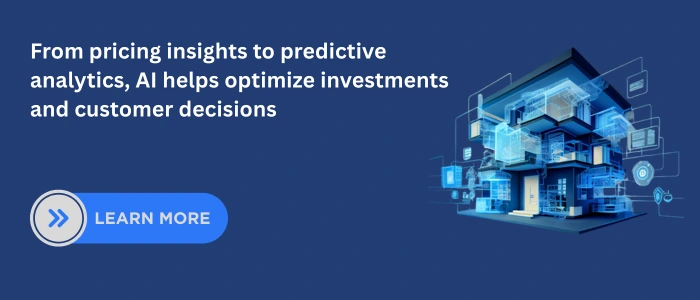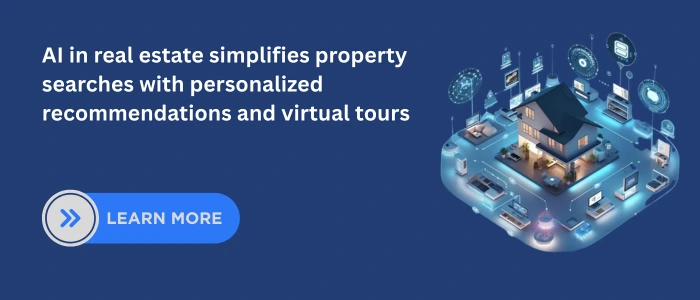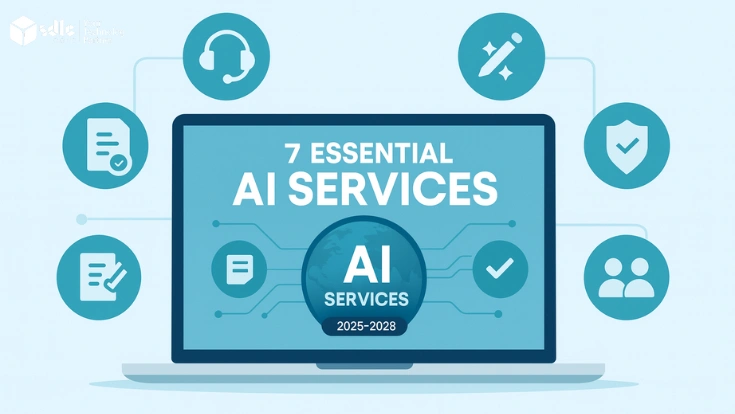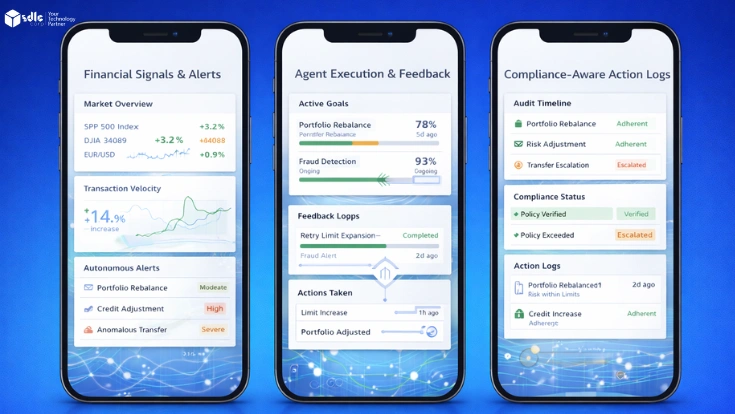Introduction
Artificial Intelligence (AI) is transforming the real estate sector by bringing automation, intelligence, and personalization to every stage of the property lifecycle. From AI-powered property valuation to smarter lead generation, AI enables real estate professionals to make data-driven decisions that improve efficiency, reduce risks, and boost profitability.With machine learning algorithms and predictive analytics, businesses can forecast housing prices, identify investment opportunities, and stay ahead of market trends. At the same time, AI enhances customer experiences through chatbots, virtual property tours, and personalized recommendations that simplify property discovery.
For real estate executives and proptech professionals, adopting AI today is essential to remain competitive in a digital-first marketplace. Partnering with experts in enterprise AI development services ensures scalable, future-ready adoption and long-term business growth.
1. AI Use Cases in Real Estate
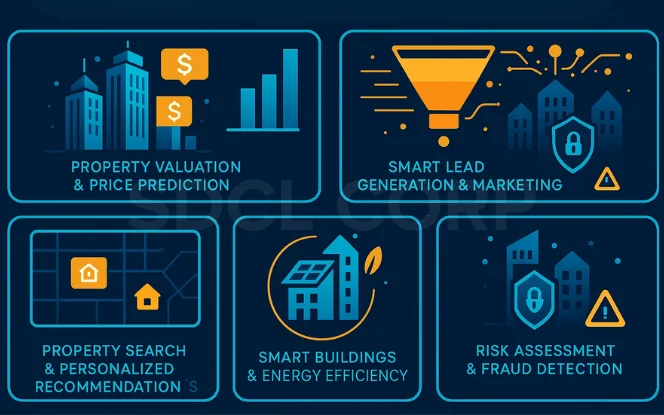
Artificial Intelligence (AI) is reshaping the real estate sector by enabling faster decisions, accurate valuations, and enhanced customer experiences. Real estate professionals, investors, and buyers increasingly depend on AI-powered platforms for transparency, efficiency, and smarter property management.
This blog explores key AI use cases in real estate, supported by real-world examples and measurable business impacts.
Property Valuation and Price Prediction
Accurate property valuation is one of the most important aspects of real estate transactions. Traditionally, valuations relied on manual assessments, comparable sales, and limited historical data. Today, AI in real estate valuation automates this process with machine learning (ML) algorithms that analyze multiple factors, including:
Property location and neighborhood growth trends
Nearby amenities and infrastructure quality
Historical transaction data and price fluctuations
Market demand–supply ratios
By integrating predictive analytics, AI-driven valuation models provide real-time, dynamic, and unbiased pricing. This ensures transparency for buyers, sellers, and investors, while reducing the risk of overpricing or undervaluation.
Business Impact : Faster and more reliable pricing builds trust among stakeholders, reduces negotiation time, and accelerates deal closures.
Smart Lead Generation and Marketing
AI is transforming real estate marketing by enabling professionals to target high-quality leads instead of relying on generic campaigns. With AI-driven predictive scoring, agents can identify buyers with the highest intent and engage them more effectively.
Key AI-Driven Marketing Strategies:
Predictive Analytics: Evaluates online behavior, demographics, and interaction history to score leads.
Chatbots & Virtual Assistants: Instantly respond to inquiries, schedule property viewings, and guide prospects through listings.
Targeted Campaigns: Tailor marketing campaigns to buyer personas, improving personalization and conversion rates.
Business Impact: Higher lead-to-sale ratios, reduced acquisition costs, and more efficient marketing spend.
Property Search and Personalized Recommendations
Searching for the right property is often overwhelming for buyers. AI-powered property search platforms solve this by providing personalized recommendations based on buyer preferences and behavior.
How AI Improves Property Search:
Filters results by location preferences and neighborhood trends
Matches properties with budget range and affordability
Suggests options based on lifestyle needs (schools, transport, amenities)
Learns from past interactions to refine recommendations over time
Virtual assistants enhance the experience by continuously adapting to buyer intent, making the property discovery process faster and more efficient.
Business Impact: Greater customer satisfaction, shorter decision-making cycles, and improved buyer engagement.
Risk Assessment and Fraud Detection
Real estate transactions involve high-value assets, making fraud prevention a top priority. AI in real estate compliance uses advanced machine learning models to detect irregularities in:
Property titles and ownership records
Mortgage applications and loan documentation
Transaction histories and payment flows
Fraudulent activities — such as identity theft, fake documents, or unusual cash patterns — are flagged in real time, allowing professionals to act quickly.
Business Impact: Stronger security, reduced financial losses, and greater trust in real estate transactions.
Smart Buildings and Energy Efficiency
AI is redefining real estate property management through smart building technologies integrated with IoT sensors. These systems optimize resources and improve tenant comfort by enabling:
Real-time energy consumption monitoring and optimization
Automated control of HVAC systems and lighting
Predictive maintenance alerts for equipment and security systems
Personalized tenant experiences through data-driven facility management
AI-powered smart buildings not only reduce operational costs but also support sustainability goals and ESG compliance.
Business Impact: Lower expenses, improved tenant satisfaction, and stronger sustainability credentials.
Advisory and Governance for Real Estate AI Systems
AI use in real estate must consider data privacy, fairness, and regulatory compliance. Governance frameworks help define acceptable data usage and model behavior. An AI consulting company may assist organizations in establishing policies and oversight mechanisms for responsible AI adoption.
2. Future Trends in AI for Real Estate
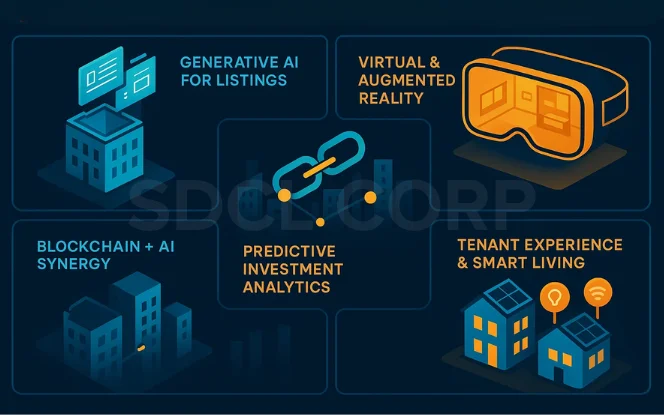
The real estate industry is evolving rapidly with the adoption of Artificial Intelligence (AI). Emerging technologies such as Generative AI, Virtual and Augmented Reality (VR/AR), Blockchain, and Predictive Analytics are driving the next wave of digital transformation. These innovations empower companies, investors, and tenants with smarter, data-driven solutions that improve decision-making and enhance user experiences.
Generative AI in Real Estate Listings
Generative AI is transforming property marketing by automating content creation for property descriptions, ads, and promotional materials.
Key Advantages:
Automated Content Creation: Generates compelling listing descriptions within seconds.
SEO Optimization: Improves online visibility by tailoring content for search engines.
Scalable Marketing: Allows realtors to publish multiple listings with minimal effort.
Business Impact: Faster content generation, broader market reach, and higher online engagement.
Explore This: Generative AI for Real Estate
Virtual and Augmented Reality in Real Estate
AI-powered VR and AR redefine property exploration, giving buyers immersive and convenient experiences without multiple site visits.
Key Applications:
Virtual Property Tours: Provide 360° immersive walkthroughs.
Renovation Visualization: AR overlays show potential interior design options.
Remote Accessibility: International buyers can explore properties without travel.
Business Impact: Lower visit costs, stronger buyer confidence, and shorter decision cycles.
Blockchain and AI Synergy in Real Estate
When combined, AI and Blockchain make real estate transactions more secure, transparent, and efficient.
Applications:
Smart Contracts: AI validates compliance before contracts auto-execute.
Tokenized Ownership: Blockchain enables fractional property ownership, while AI ensures secure exchanges.
Fraud Prevention: AI detects anomalies in contracts and digital transactions.
Business Impact: Enhanced security, improved transparency, and faster global property deals.
Predictive Investment Analytics in Real Estate
AI helps investors evaluate opportunities with greater precision through predictive investment models.
Factors Analyzed:
Market demand fluctuations
Rental yield trends
Neighborhood development patterns
ROI forecasting
Business Impact: Higher returns, lower risks, and more efficient portfolio management.
Smart Living and AI-Enhanced Tenant Experience
AI extends beyond transactions into property management and tenant living experiences.
Key Applications:
AI-Driven Apps: Streamline rent payments, maintenance requests, and bookings.
Predictive Maintenance: Detects equipment issues before failures.
Personalized Services: Integrates with smart homes for custom tenant experiences.
Business Impact: Increased tenant satisfaction, reduced operational costs, and higher retention rates.
Final Thoughts
The future of AI in real estate will be defined by automation, personalization, and security. Technologies like Generative AI, VR/AR, Blockchain, and Predictive Analytics are setting new standards for transparency, efficiency, and tenant-centric services. Real estate companies that adopt these innovations early will secure a sustainable competitive advantage, strengthen customer trust, and drive long-term growth in a digital-first marketplace.
Learn more about AI Development in smart property management
3. Implementation Roadmap for AI in Real Estate
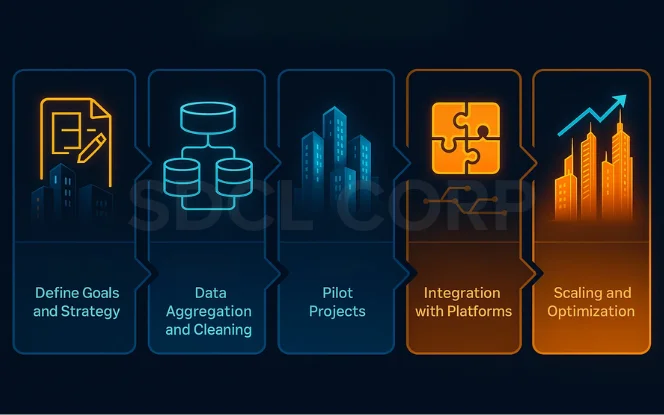
Successfully implementing AI in real estate requires a structured roadmap. Companies must align AI adoption with business goals, ensure data readiness, and integrate solutions into existing operations. Below is a step-by-step AI implementation roadmap tailored for the real estate industry.
Step 1: Define AI Goals and Strategy in Real Estate
AI adoption begins with a clear strategy. Companies should align initiatives with growth priorities such as:
Enhancing property valuation accuracy
Improving tenant experience with smart services
Reducing fraud and financial risks
By identifying high-impact use cases, organizations ensure that AI investments deliver measurable results.
Business Impact: Focused strategies improve ROI and minimize wasted resources.
Step 2: Data Aggregation and Cleaning for AI Readiness
AI depends on high-quality, secure datasets. Real estate companies must collect and refine:
Property listings and transaction history
Demographic and behavioral customer data
Financial and compliance records
Data cleaning enhances accuracy, while privacy regulations like GDPR guide secure handling. Prioritizing compliance strengthens trust and reduces legal exposure.
Business Impact: Reliable datasets improve AI model accuracy and reduce regulatory risks.
Step 3: Pilot Projects for AI in Real Estate
Before scaling, businesses should launch AI pilot projects in select areas such as:
AI Chatbots: Improve customer service with automated, 24/7 responses.
Valuation Tools: Deliver instant, AI-driven property pricing.
Fraud Detection Systems: Flag suspicious transactions early.
Each pilot must include measurable KPIs like cost savings, response time, or fraud detection accuracy.
Business Impact: Pilot projects validate AI solutions, reduce risks, and provide early wins.
Step 4: Integration of AI with Core Platforms
After successful pilots, AI must be integrated into enterprise platforms:
CRM Systems: For predictive lead generation and personalization
Property Portals: For AI-powered property recommendations
ERP Systems: For financial, compliance, and operational insights
Employee training is essential to ensure teams can interpret AI outputs and make informed decisions.
Business Impact: Integrated AI solutions increase efficiency and drive adoption across the workforce.
Step 5: Scaling and Optimizing AI Solutions
The final stage focuses on expanding and optimizing AI adoption:
Extend pilots into new markets or regions
Continuously retrain AI models with updated datasets
Optimize infrastructure for scalability and compliance
Ongoing monitoring ensures models remain accurate, efficient, and regulatory-compliant.
Business Impact: Scaled AI adoption maximizes long-term ROI and builds sustainable competitive advantage.
Final Thoughts
An AI roadmap for real estate is not only about technology it’s about aligning strategy, preparing data, piloting effectively, and scaling intelligently. Companies that follow this roadmap unlock long-term value, stronger customer trust, and competitive edge in a digital-first marketplace.
4. Top AI Tools and Platforms for Real Estate
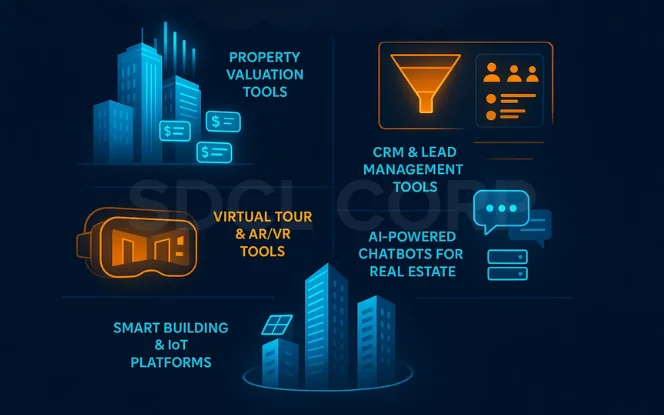
Real estate professionals increasingly rely on AI-powered tools and platforms to improve decision-making, streamline workflows, and engage customers more effectively. From AI property valuation to smart building management, these solutions deliver real-time insights, predictive analytics, and immersive experiences that keep businesses competitive in today’s digital-first market.
AI Property Valuation Platforms
Accurate property pricing is the foundation of real estate success. AI-driven valuation platforms analyze historical sales, neighborhood dynamics, and market trends to provide instant, data-backed insights.
Popular Tools:
Zillow Zestimate – Real-time pricing based on large datasets.
HouseCanary – Predictive analytics for residential and commercial valuations.
Redfin Estimate – Instant valuations with neighborhood-specific insights.
Key Benefit: Automated valuations deliver faster, transparent, and fair pricing decisions.
AI CRM and Lead Management Tools
AI-powered CRM platforms transform the way real estate companies attract and manage leads. These systems leverage predictive analytics to identify high-intent prospects and automate sales workflows.
Popular Tools:
HubSpot AI – Lead scoring, personalization, and workflow automation.
Salesforce Einstein – Predictive scoring, automated follow-ups, and pipeline visibility.
Key Benefit: Higher lead conversion, better qualification, and reduced manual effort.
Virtual Tour and AR/VR Platforms in Real Estate
AI-enhanced AR/VR platforms create immersive property experiences, helping buyers explore listings remotely, visualize renovations, and make confident purchase decisions.
Popular Tools:
Matterport – Creates 3D digital twins for interactive walkthroughs.
RoOomy – AR-based interior design and virtual staging.
EyeSpy360 – Mobile-friendly 360° virtual property tours.
Key Benefit: Improved buyer engagement, fewer site visits, and faster decision cycles.
AI-Powered Chatbots for Real Estate
AI chatbots automate property inquiries, lead qualification, and scheduling, reducing the workload for real estate agents while improving responsiveness.
Popular Tools:
Drift – Conversational AI for instant property inquiries.
Intercom – Automates chat flows and integrates with CRM systems.
Tidio – Multilingual chatbots tailored for real estate businesses.
Key Benefit: 24/7 customer service and better lead nurturing.
Smart Building and IoT Platforms
AI-driven smart building platforms use IoT sensors to optimize energy efficiency, security, and tenant experiences.
Popular Tools:
BuildingIQ – AI platform for energy optimization.
Honeywell Forge – Enhances operations and predictive maintenance.
IBM Watson IoT – AI-powered automation and tenant insights.
Key Benefit: Lower operational costs, sustainable energy use, and improved tenant satisfaction.
AI Tools in Real Estate: Comparison Table
| Tool/Platform | Category | Key Benefit |
|---|---|---|
| Zillow Zestimate | Property Valuation | Accurate, instant property pricing |
| Salesforce Einstein | CRM & Lead Management | Predictive scoring, automated workflows |
| Matterport | Virtual Tours (AR/VR) | Immersive 3D property experiences |
| Drift | AI Chatbots | 24/7 customer support & lead qualification |
| BuildingIQ | Smart Building Platform | Energy savings and operational efficiency |
Final Thoughts
AI tools are no longer optional—they are strategic enablers for real estate. From Zillow Zestimate for pricing to Matterport for immersive tours and Salesforce Einstein for CRM, these platforms help companies improve efficiency, maximize ROI, and deliver better customer experiences.
Check Out : How will Blockchain and NFTs Change Real Estate Industry?
5. ROI and Business Impact of AI in Real Estate
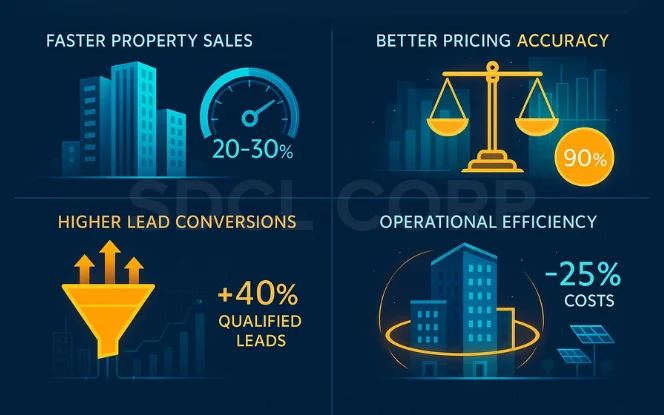
Artificial Intelligence (AI) is not only transforming real estate workflows—it is delivering measurable business impact and ROI. By reducing costs, accelerating transactions, and improving customer engagement, AI adoption generates tangible financial and operational value. Companies investing in AI solutions achieve stronger profitability, sustainable growth, and a long-term competitive edge.
Key ROI Metrics for AI in Real Estate
Faster Property Sales
AI-powered valuation models and predictive lead scoring accelerate the sales cycle by 20–30%, ensuring quicker revenue realization and improved cash flow for developers and brokers.
Business Impact: Faster sales = stronger liquidity and improved deal velocity.
Better Pricing Accuracy
With AI-powered property valuation, pricing accuracy reaches up to 90%, reducing negotiation friction and creating trust among buyers and sellers.
Business Impact: Transparent pricing builds confidence and increases closure rates.
Higher Lead Conversions
AI-driven predictive marketing increases qualified leads by 40%, reducing acquisition costs and improving campaign ROI.
Business Impact: More qualified buyers, stronger conversion rates, and higher marketing efficiency.
Operational Efficiency and Cost Reduction
Smart building platforms powered by AI cut energy and maintenance costs by up to 25% while supporting sustainability initiatives.
Business Impact: Lower operating costs and stronger ESG credentials.
ROI Metrics in AI for Real Estate
| Metric | AI Impact Example | Business Value |
|---|---|---|
| Sales Cycle Time | AI reduces cycle by 30% | Faster revenue generation |
| Valuation Accuracy | AI boosts accuracy to 90% | Trustworthy, transparent pricing |
| Lead Conversion Rate | AI raises qualified leads by 40% | Higher sales volume and efficiency |
| Energy Efficiency | Smart AI lowers costs by 25% | Sustainable, cost-effective ops |
Final Thoughts: AI ROI in Real Estate
The ROI of AI in real estate is both measurable and strategic. By accelerating sales cycles, ensuring accurate pricing, improving lead conversions, and reducing operational costs, AI delivers direct financial and long-term business benefits.
Forward-looking companies that adopt AI now will secure:
Faster growth
Stronger customer trust
Sustainable market leadership
Partner with experts in AI Develoment adoption for real estate
Conclusion
Artificial Intelligence is reshaping real estate by elevating property valuation, customer experiences, and investment strategies. The future lies in predictive analytics, AR/VR property tours, and blockchain-AI synergy, which deliver immersive, data-driven, and secure real estate solutions.
Leaders who embrace AI early gain competitive, operational, and customer-centric advantages. With trusted partners like sdlc corp, offering AI development services and custom solutions, real estate organizations can move from strategy to full-scale deployment with confidence. Discover AI Development Services
FAQs
1. How Is AI Used In Real Estate?
AI in real estate is used for property valuation, predictive marketing, fraud detection, virtual tours, and smart building management. It helps agents and investors make faster, data-driven decisions.
2. Which AI Tools Are Best For Real Estate Agents?
Popular AI tools include Zillow Zestimate for property valuation, Salesforce Einstein for CRM automation, Matterport for 3D tours, and Drift for AI chatbots.
3. What Are The Benefits Of AI In Real Estate?
The main benefits include faster property sales, higher pricing accuracy, improved lead conversions, reduced operational costs, and better tenant experiences.
4. How Does AI Improve Property Valuation?
AI models analyze location, amenities, demand, and historical data to deliver real-time, accurate property valuations, ensuring transparency for both buyers and sellers.
5. What Is The ROI Of AI In Real Estate?
AI reduces sales cycles by up to 30%, improves pricing accuracy by 90%, raises lead conversions by 40%, and cuts smart building costs by 25%, creating measurable ROI.
6. What Is The Future Of AI In Real Estate?
The future lies in Generative AI for property listings, VR/AR immersive tours, predictive investment analytics, and blockchain-AI synergy for secure transactions.

